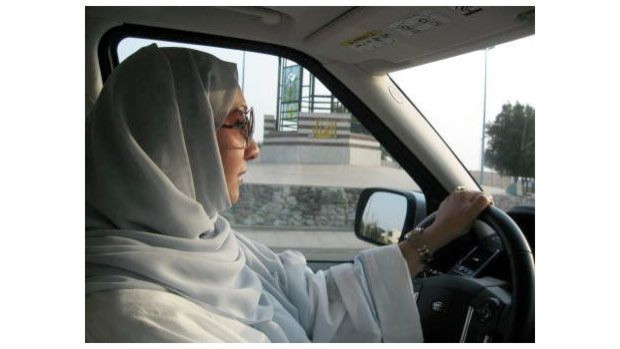Why Aren't Saudi women allowed to drive?

The driving protest of the Saudi women going on for a month now could hardly get a dozen of hands behind the wheel, the same number that succeeded to do so during the last public driving protest 20 years ago.
Twitter and Facebook are overwhelmed with videos of Saudi women driving, which they posted to send their message across and get support to their mission to drive legally in Saudi Arabia.
We want women from today to begin exercising their rights,'' Wajeha al-Huwaidar, a Saudi womens' rights activist, said.
She has posted internet clips of herself driving in 2008.
Today on the roads is just the opening in a long campaign, she said. We will not go back.''
A campaign was launched by the conservatives on Facebook, threatening to bash up those who escorted women to drive.
Last month Manal al-Sharif, a female Saudi activist who had posted a video of herself driving around the eastern city of Khobar while chatting with a friend, was arrested and the video she put up was removed from the Youtube. The Facebook page she created calling on Saudi women to collectively defy the driving ban on June 17 was also removed.
A Saudi security official said she is being accused of “violating public order.”
The Islam based theocracy in Saudi Arabia imposes certain laws which discriminate women in many ways from men including a ban on driving. Saudi clerics issued a non-binding fatwa, or religious edict, in 1991 banning women from driving. Following an earlier generation's attempt to protest the ban, the interior ministry decreed that women should never drive. Saudi Arabia is the only country in the world which issues driving license only to men.
According to Sharia (Islam law), all women need to have a male guardian along with them and the Islam clerics believe that it is indecent for a woman to drive as it would reveal their hands and increase their chances of socializing with young men.
Earlier this year, petitions were filed to the Shoura Council to discuss the freedom of women to drive in the kingdom, but the council denied the receipt of it.
According to the petition, many Saudi women acquire international driving licenses from other countries and drive when abroad. “We appeal to the Shoura Council to discuss the matter and permit it on an experimental basis, at particular times and in selected cities or places accompanied by harsh and deterrent regulations to protect women from any kind of harassment,” say signatories of the petition.
Currently, the Saudi women are discussing on Twitter and Facebook on how to obtain international driving license.
After the start of the Women2Drive campaign, it has become more difficult to obtain international driving license. The only way to get international driving license legally was to get it through travel agencies but reports say that even they have stopped taking applications for new licenses now.
The Saudi activists have even approached U.S. Secretary of State Hillary Clinton seeking her support for their right to drive' in the country.
They had written a letter to her saying, “On June 17, more Saudi women drove a car than ever before. But as we launch the largest women’s rights movement in Saudi history, where are you when we need you most? In the context of the Arab Spring and US commitments to support women’s rights, is this not something the United States’ top diplomat would want to publicly support?”
After remaining silent for a long time, she bowed to international pressure this week and voiced support for Saudi Arabian women seeking to lift the kingdom’s Islam-based ban on women driving.
Clinton announced that she raised the ban on Saudi women’s driving with “the highest level of the Saudi government.”
Saudi King Abdullah has apparently promised some social reforms, but his decision would depend on the clerics because they are the key supporters of his family and hence he is likely not to violate the religious establishment.
On Sunday, the Saudi parliament received 1,000 letters from the public urging a long standing ban on driving cars by women.
“Not a single letter supported the idea of driving cars by women….but as far as we are concerned, there are no red lines for us to debate this issue,” said Mashaal Al Ali, head of the human rights committee in Shura.
The protest for women rights to drive goes back to 1990 which was vehently denied by fatwas issued by the religious authorities formally banning women from driving.
There is no written Saudi law barring women from driving but many fatwas by clerics do following a strict group of Islam known as Wahhabism in the kingdom.
The question is if the rulers in Saudi Arab continue to have such harsh control on their women, how far will the protest be successful?
© Copyright IBTimes 2024. All rights reserved.





















